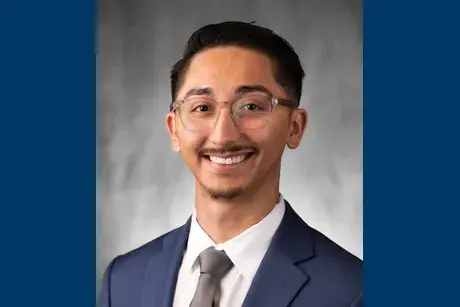Rooted in Commitment: Geovanny Amaya L'24

Growing up as a first-generation American, Geovanny Amaya thought there was a strong chance he would go into immigration law. But when he arrived at RWU Law three years ago, he thought he should keep an open mind to other options that might present themselves. Initially, he worked in housing law with the Indigent Help Desk and the Pro Bono Collaborative, both of which he found rewarding enough to consider going into housing law after graduation. But during his 2L externship with the Central American Refugee Center (CARECEN) his passion for immigration law was reignited—and he has not looked back since. “I believed immigration law was the path that suited me best,” says Amaya. “As the bilingual child of immigrants, I knew it would be a great way to give back to my community.”
Amaya’s passion and commitment make perfect sense given his family background. His parents and grandparents retreated to the US from El Salvador to escape civil war. His parents were children when they immigrated, and in part because of their youth, they were able to assimilate fairly well to life in the US, and both earned higher educational degrees. But others in Amaya’s family and his larger community had different experiences—and required a great deal more help to adjust and thrive in their new home. The challenges faced by the people around him made Amaya consider how those same challenges might be impacting others in the wider world. “I realized many people have faced issues that have made them want or need to leave their original country,” says Amaya. Learning more about how to help those people gives me a sense of purpose and allows me to support other people in a way that other immigration attorneys assisted my family.”
Recently, Amaya received an Immigrant Justice Corp fellowship at CARECEN, and will be returning there post-graduation to work assisting unaccompanied children. He explains, “I will be working with undocumented children who arrive in the US. Sometimes they arrive here by themselves or with siblings, often to escape abusive parents and situations. I’ll be helping them in seeking special immigrant juvenile status, which entails petitioning for them to remain in the US. We also work to pair them with a guardian, such as a grandparent or an aunt or uncle, and then begin the process of getting the children green cards.”
As he prepares to bid RWU Law goodbye, Amaya wants other students to understand how valuable it can be to spend time in the Immigration Clinic, even if they are not interested in immigration law. “Having the clinic here in the school is definitely a great experience for students who want to get trial experience in general. Our professor, Deborah Gonzalez, really allows us to be hands-on student attorneys,” says Amaya. “And we don’t just go to immigration court; we go to family court and probate court. Many of the special immigrant juvenile cases start in family court, so just being able to appear in front of a judge in that way can really improve your confidence.”
While he is already taking steps toward his future, Amaya has taken his own advice to heart and remains highly engaged with the Immigration Clinic. “I’m still at the clinic right now,” he says. “It is stressful work, but I still enjoy it. I spend a lot of time here just so I can be the most effective student attorney I can be.”
